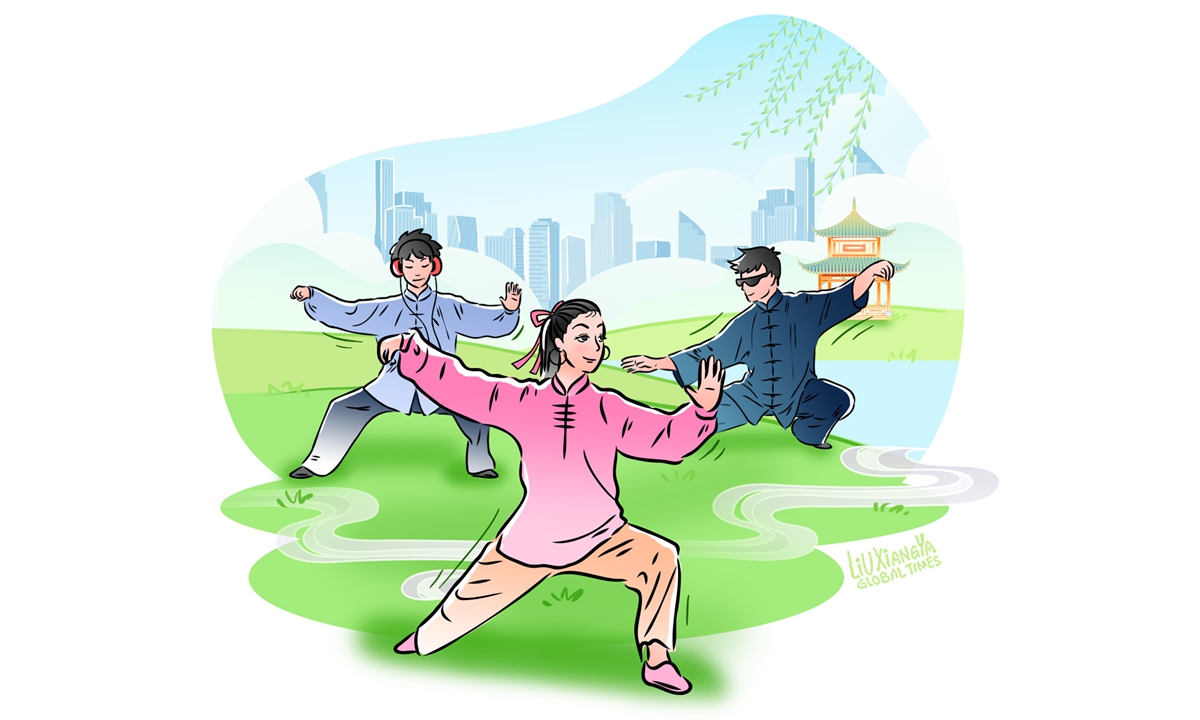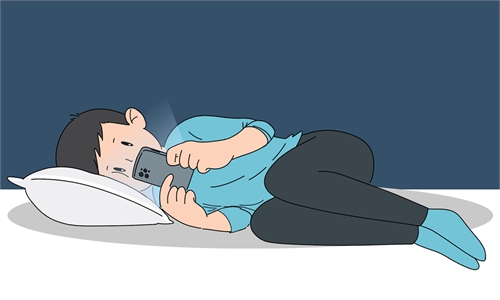ARTS / CULTURE & LEISURE
Traditional health pursuits get younger

Illustration: Liu Xiangya/GT
Nowadays, more Gen Zers and post-2000s are following Chinese-style routines to stay healthy, such as drinking healthy tea, soaking their feet, and practicing baduanjin, literally "Eight Section Brocade," a type of Chinese physical exercises handed down from ancient times.Every weekend, many youngsters flock to Beijing's Taoist Baiyun Temple to attend free tai chi and baduanjin classes.
Openings are limited and often booked in under a minute by enthusiasts, the vast majority are young people. Those who don't manage to register also show up to take any open spaces.
Eight Section Brocade can be traced back to the Song Dynasty (960-1279) and is now being picked up again by young people, who call it their ancestors' first set of "gymnastics."
The topic of "Eight Section Brocade" has earned over 440 million views on Xiaohongshu, a Chinese lifestyle-sharing platform also known as Little Red Book.
New Chinese-style healthcare is more comprehensive than these forms. It also refers to slowing down the pace of life and returning to simplicity and nature.
For example, a 20-minute park visit can have a profound positive effect on both body and mind.
From self-healing to health preservation, the trend favored by contemporary young people integrates traditional Chinese medicine culture with modern scientific health concepts.
According to data, the topic of "health preservation" earned 2.51 billion views on Xiaohongshu in 2023, with a total of 5.32 million new notes added.
So why has new Chinese-style health preservation become so popular among the Gen Z?
Firstly, it's the evolution of values against today's social background. Young people tend to focus more on the present and remain loyal to their true feelings.
In modern society, too many people are like hummingbirds flapping away without taking a break. They are busy pursuing the future and ignoring the significance of today.
As most of them are in search of clarification of what a better tomorrow can look like, consequently some may ignore the true meaning of their daily life.
By practicing tai chi and Eight Section Brocade, which calls for concentration and meditation, they are able to settle down, like a flapping hummingbird who finally settles on a branch.
Taking things one day at a time, young people begin to listen to their inner voices and reflect on their lives, pursuing a self-harmonious mind-set.
Their understanding of "health" is more defined than that of the previous generation, and encompasses both physical and mental health.
Looking back at the 1960s, the emergence of the Beat Generation in the US also had its own social roots.
US youth who grew up under modern material conditions sought after a higher-level spiritual life, such as Henry David Thoreau and his Walden, which complies with Abraham Maslow's hierarchy of needs.
Secondly, the charm of China's traditional culture attracts and empowers youngsters.
People spend a longer time scrolling through their phones in their spare time and seldom go outdoors.
The Yellow Emperor's Classic of Medicine states that if one stays indoors for a long time, their spiritual energy will disappear; thus, people need to go outside to recharge their energy.
Taoism says if a person can be pure and still, all of Heaven and Earth will return to him.
Practicing tai chi requires focus and helps people calm down, allowing them to experience a process of purification, enjoy peaceful happiness and recharge themselves. Enhancing concentration leads to better engagement and higher efficiency at work.
Thirdly, practicing Eight Section Brocade assists in maintaining good health and relieving stress, which refreshes the body and mood.
Many young people on Xiaohongshu have shared their experiences improving their physical and mental health and becoming more confident and beautiful.
According to the teacher at the Baiyun Temple, the movements he teaches are designed to aim at the unhealthy condition of many people who do not exercise.
Vigorous exertion and breathing allow qi, the body's energy, and blood to move quickly, making people feel more relaxed and less likely to get sick.
In fact, due to the long-term pressures of life and mental stress, they are unable to relax their body entirely, which can lead to long-term problems such as shoulder and neck stiffness and depression.
Through practice, people gradually become optimistic because their qi is able to move freely.
In addition, these new Chinese-style health activities have become a unique social currency for young people.
This healthy lifestyle has created substantial emotional value, enriching their lives and giving them a sense of identity.
The author is a faculty member with the School of Applied Economics, Renmin University of China. life@globaltimes.com.cn



